This piece is part of a series remembering the life, career, and legacy of Helmut (Hal) Sonnenfeldt — a member of the National Security Council, counselor at the Department of State, scholar at the Johns Hopkins School of Advanced International Studies (SAIS), and Brookings expert. The following is the eulogy that former Secretary of State Henry Kissinger delivered at Hal’s funeral in 2012.
Hal was my friend and my associate and in many ways his life paralleled mine. I met Hal in 1946, when we were both in the Counter Intelligence Corps of the Army.
We were brought together by an extraordinary personality, Fritz Kraemer. To describe Fritz Kraemer would take us ‘til dinnertime. He was a refugee from Germany who did not have to leave Germany. He wore a monocle, riding boots, and a riding crop — as a private in the United States Army! — and he survived! He was a man of extraordinary conviction, who devoted much of his life to inspiring younger people. And he picked out Hal and me, out of different units, and he brought us together at the European Command Intelligence School in Oberammergau.
As it turned out, Hal’s views and mine were very parallel. And I am moved by the letters that have been distributed here [from that time] because they are very similar to letters I wrote to my parents: the sense of wonder that, after having seen the disintegration of the societies in which we grew up, we should be brought back, at a very young age, to contribute to working on what we considered the challenge of world peace.
On the one hand, our job was to contribute to the de-Nazification of Germany, but our impetus was the good fortune of being able to work on building a world that transcended the experiences of our youth.
That is the key element to understand about Hal Sonnenfeldt.
Through Kraemer, we stayed in frequent contact with each other. And, when I was appointed national security advisor, one of my first, perhaps my first appointment was Hal Sonnenfeldt as the principal adviser and assistant and associate on East-West relations.
It was a period of extraordinary complexity. There were 500-plus thousand [American] troops in Vietnam, and their number was still increasing on a schedule established by the previous administration. The Soviet Union had just occupied Czechoslovakia. Relations with China were totally blocked.
And the goal that we set ourselves, in the Nixon administration, was to simultaneously conduct a series of policies that were very hard to connect with each other:
- To begin a withdrawal from Vietnam, but to do it in a manner that did not undermine the alliances on which the security of the world had been based,
- To prevent repetitions of the Soviet adventures in Central Europe, but to keep open the possibility of a relaxation of tensions,
- And all of us who went through that period had a sense that we owed it to the American people to put forward a vision of peace that showed that there was something more to American foreign policy than the war in Vietnam.
Hal was an indispensable associate in all these enterprises. He was the principal author of a document which we circulated in the early part of the administration to reluctant agencies, in which we said, one could not take relations with the Soviet Union in isolation, one had to find a means of relating events in one part of the world to those in others.
And Hal was, of course, instrumental in implementing that policy. It was years in which arms control negotiations were taking place side by side with crises — first in Jordan, and then in the Middle East war in 1973.
There were occasions when we increased our military preparedness, and that had to be communicated to the other side. But there were more occasions when we negotiated with the Soviet leaders about the kind of world that might gradually be formed.
And of course, arms control was an important aspect of it, for one fundamental reason: If you knew the consequences of nuclear war, you knew you had an obligation to do your utmost to prevent it.
We now speak of the Cold War as a sort of quaint event that was simple, compared to the staggering complexity of the present. But the people who managed that period were importantly shaped by the knowledge that, whatever else they did, they had to avoid the ultimate danger.
So I mention these events because Hal’s role was inseparable from all the events that included any aspect of the Soviet Union. And if you consider the amount of effort he has needed to negotiate wrist watches and belts and other exchanges with Brezhnev [stories related earlier in the service by Walter Sonnenfeldt], it’s all the more staggering that he managed to write profound memoranda, participate in all the key negotiations, and help draft, or draft, the key documents on which they were based.
Of course, I have read many of the stories of the flawed relationship that sometimes existed, or is alleged to have existed, between Hal and me, but I want to point out, of course, that the difference concerned really only one subject, which was Hal’s interpretation of the Cold War, which Hal interpreted as being all-embracing, that there was no subject in the world that was not included in his responsibilities, which meant a certain duplication of the work that I was doing.
So, my associate Jerry Bremer used to say, “Hal has the best intelligence system in town. Unfortunately, it’s aimed at you!”
But, when you read these stories, look at the list of all the negotiations that were conducted in this period, and the results of these negotiations, and you know that Hal was sitting right next to me when they were conducted, that he was the key drafter of the documents on which they were based.
I might give, however, the full version of the Sonnenfeldt Doctrine. I think, if Strobe will forgive me, it didn’t quite happen that Hartman asked Hal to put forward the Sonnenfeldt Doctrine. What happened was that there was an assembly of [American] ambassadors that dealt with European issues, that I brought together every few months, and to which I then made a speech outlining key elements of American foreign policy.
At the end of that speech, Hal pointed out to me — which was not the most unusual event — that, brilliant as my remarks had been, there was something lacking in them that I ought to have given more attention to — and that was the subject of Eastern Europe.
So — first, he had a point, which was one of the troubles. So I told him, “they’re all here (this was a Friday night), why don’t you meet with the ambassadors tomorrow morning, and give them your extension of my remarks” — the theory being that every State Department document is unfortunately signed by the secretary of state, so we had to put it that way.
Well, anyway, Hal made his remarks, and then they were memorialized in a document distributed throughout the world. There are two things to be said. One, the word “organic” was perhaps not the best one to choose in a year when some people thought that, if Nixon is for peace, maybe a little confrontation would be healthy.
But the substance was exactly what our policy was, and what turned out to be correct. As Strobe correctly pointed out, he [Hal] was saying, “If this relationship between the Soviets and Eastern Europe is not pushed together by military pressure, but permits an evolution of these societies, these societies will break away from the Soviet Union.” And it was in pursuit of that policy that Hal was a participant — an associate, the drafter of visits by the president to Poland, to Yugoslavia, to Romania — which no president had ever done before — and which symbolized the importance we attached to the liberation of Europe.
So, let me return to where I started: Hal was my friend. He was my associate. We thought along similar lines. I thought him indispensable. And what I find moving is that, when I travel now, and meet people who have encountered Hal or knew him, that they talk of him with enormous affection, and they do me the honor of expressing condolences to me, because they understand that he was more than an associate.
I met with former Chancellor Schmidt last week, and we were talking about Hal, and he said, “you know, what was most important about Hal to me is that he was so totally independent.” And I received a telegram last week from Andrew Knight, former editor of The Economist, who expresses the sentiments I try to convey here very well. He says, “I have just seen a late report in the U.K. press of Hal’s death. I think of you strongly, as well as of him, at this time. To me, Hal was an unusual figure, in that he never hesitated to express his own individual analysis of all those great issues in your territory at State. And yet, while marking out his own view, he always conveyed at the same time a ferocious loyalty to you, and admiration of you. I always hope you look back with pride, and I hope Hal did, through all the turmoil…”
So, the main point I want to leave you with is: Hal made a difference, to his country, to the world, and to the people whose lives he touched.
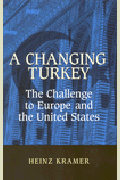
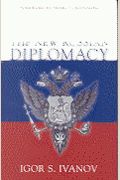
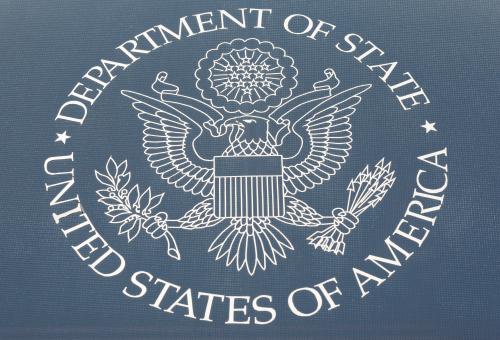
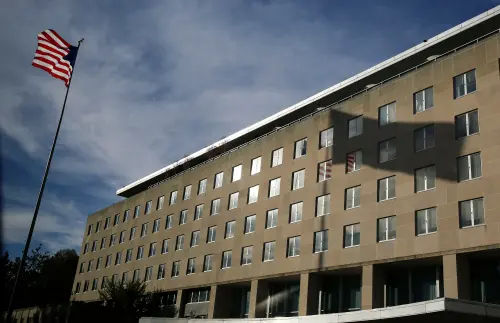
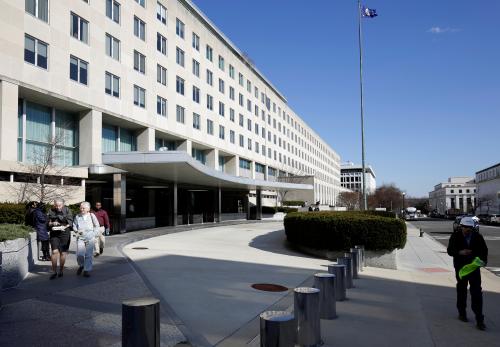


Commentary
Henry A. Kissinger eulogy for Helmut Sonnenfeldt
October 17, 2019